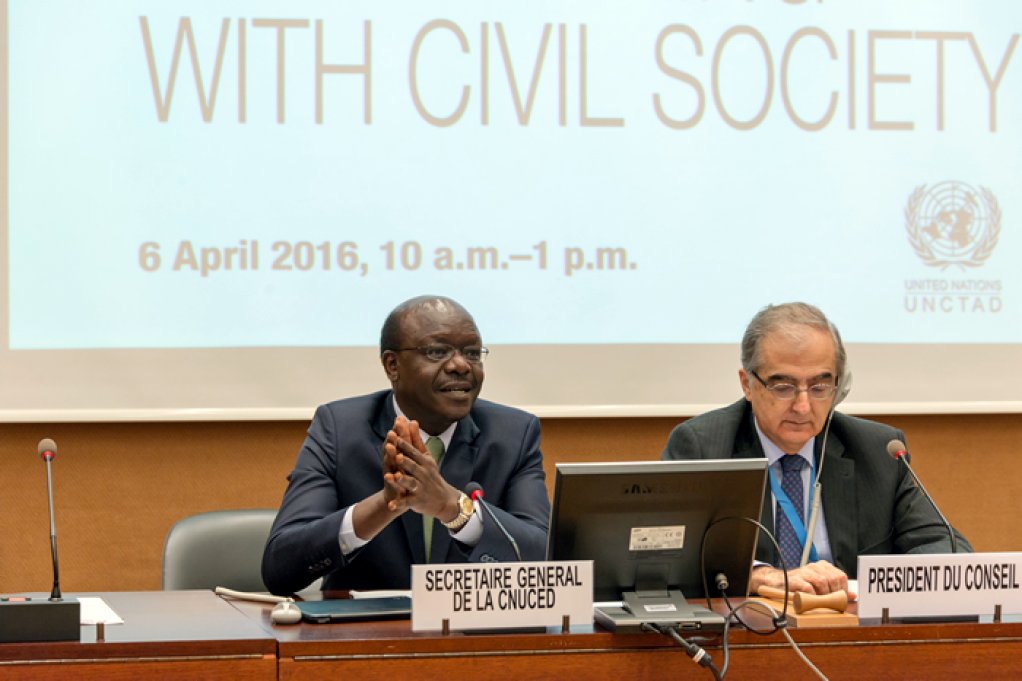The hearing, held as part of the official preparatory process for UNCTAD's fourteenth ministerial conference (UNCTAD 14), set for 17-22 July in Nairobi, Kenya, was attended by more than 100 representatives from civil society, intergovernmental organizations, member States and the UNCTAD secretariat.
At the heart of the discussion was UNCTAD's role within the context of the 2030 Agenda for Sustainable Development and how the organization could best assist countries as they begin working on the Sustainable Development Goals (SDGs).
The discussions covered many important topics, but particular attention was given to the issue of policy space and the structural constraints that limit developing countries' abilities to set and execute their own development plans. In this regard, UNCTAD's work on corporate tax avoidance, sovereign debt restructuring and international investment treaty reform was seen as vital for the success of the 2030 Agenda.
UNCTAD Secretary-General Mukhisa Kituyi attended the hearing, re-emphasizing that civil society are "trusted partners" in the organization's work. In his opening speech, he highlighted that their role in helping UNCTAD deliver on its new mandate "will be even more critical than in the past".
"Our mandate and fidelity to the Agenda 2030 will be strengthened by finding synergies with the voices of civil society, as representatives of the majority of grass roots movements," he added.
The hearing participants agreed that domestic resource mobilization-the process by which countries raise and spend their own funds for their own development-is necessary to ensure long-term financing for the programmes and policies needed to achieve the SDGs.
But as several speakers pointed out, the current global financial system allows companies to legally divert profits, i.e. taxable income, from developing countries, and this greatly limits their ability to provide for their own people.
According to the director of policy and governance at Public Services International, Daniel Bertossa, conservative estimates show that 30 trillion US dollars sit in legal offshore tax havens, 10 trillion of which come from the least developed countries.
"This means that in continents like Africa there is more capital outflow to tax havens than there is capital inflow for development", Mr. Bertossa said.
Civil society representatives therefore called on UNCTAD to continue its work on corporate tax avoidance, which they said provides a solid baseline for the debate that needs to take place on how this legal draining of financial resources will affect developing countries' efforts to achieve the SDGs.
Likewise, discussions on the challenge of rising sovereign debt and how it will hinder countries' capacities to invest in social programmes and policies underscored the importance of UNCTAD's work on debt management and sovereign debt restructuring, "issues for which UNCTAD's research, policy advice and technical assistance is vitally needed".
Other constraints on countries' abilities to take charge of their own development highlighted at the hearing were certain provisions in international investment agreements.
Sanya Smith, legal advisor and senior researcher with Third World Network, said that provisions like intellectual property rights limit governments' abilities to put in place regulations that, for example, could make medicines more affordable and reduce air and water pollution.
Civil society representatives requested therefore that UNCTAD strengthen its work on reforming the international investment agreements regime to help bring it more in line with the sustainable development agenda.
The hearing marked an important moment in the preparatory process for UNCTAD 14 because it was the first opportunity for non-state actors to officially comment on the pre-conference negotiating text, currently under discussion between member States.
Prior to the hearing, on 5 April, civil society representatives met with the Chair of the Preparatory Committee, UNCTAD's Deputy Secretary-General and delegates from member States to discuss in a more informal setting their role in UNCTAD 14 and the preparatory process.
UNCTAD Deputy Secretary-General Joakim Reiter said that although the primary responsibility for defining UNCTAD's new mandate rests with governments, "civil society can play a significant role in enriching the debates-bringing to the discussion their experiences from the field-and in advocating for the agreed outcomes".
In this sense, Mr. Reiter added, "Civil society has an important role to play in reinvigorating our work." He also underlined that UNCTAD is working hard to ensure multi-stake holder participation throughout the entire conference.
A Civil Society Forum will be organized at the Kenyatta International Conference Centre, from 14-21 July 2016, as an official part of UNCTAD 14.
The Preparatory Committee for UNCTAD 14 will hold a second hearing with civil society on 26 May 2016, also at the Palais des Nations in Geneva.
Submitted by UNCTAD
EMAIL THIS ARTICLE SAVE THIS ARTICLE
To subscribe email subscriptions@creamermedia.co.za or click here
To advertise email advertising@creamermedia.co.za or click here











